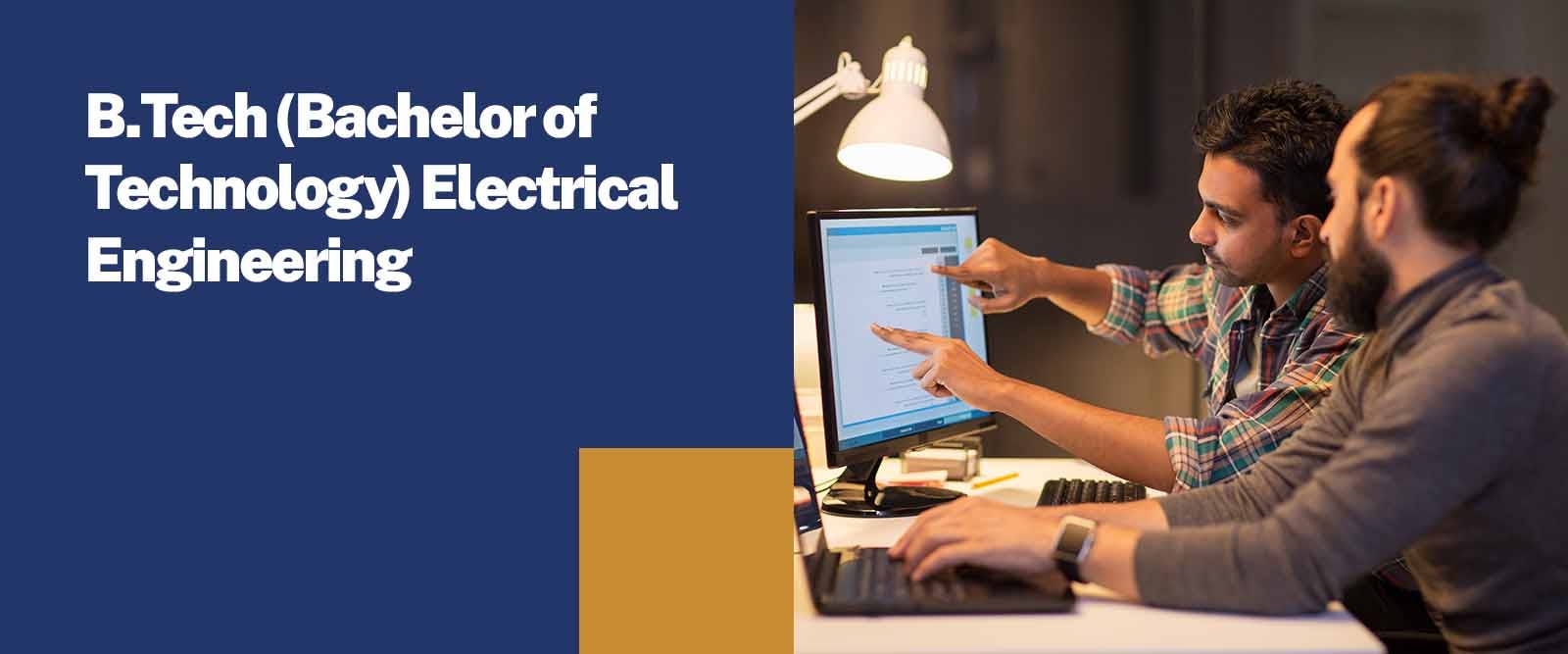5800 students unlocked their dream jobs with UG/PG programs in top colleges. Apply Now!
Bachelor of Technology or B.Tech Electrical Engineering is an undergraduate programme widely acknowledged in India and abroad. The typical length of study for this engineering degree is four or five years.
Electrical engineers usually hold an undergraduate degree in Electrical Engineering, Electronics Engineering, Electrical Engineering Technology, or Electrical and Electronic Engineering. All the above programmes teach the same B.Tech electrical engineering subjects and core principles, though the emphasis may differ depending on the degree title. (See: B.E. vs B.Tech)
Overview of B.Tech Electrical Engineering
|
Particulars |
Course Details |
|
Programme Level |
Undergraduate |
|
Duration |
Four years |
|
Course Evaluation |
Annual or Semester-based Assessment |
|
Admission Process |
Entrance-based Admission |
|
Student Eligibility |
|
|
Total Tuition Fee |
Approximately ₹3 lakhs to ₹5 lakhs (may vary from university to university) |
|
Average Salary Upon Graduation |
₹2.4 lakhs per year |
|
Top Industries for Job Opportunities |
IT Services and Consulting, Engineering and Construction, Education and Training, Telecommunication, and Industrial Machinery |
|
Top Recruiters |
Larsen & Toubro Limited, Tata Consultancy Services (TCS), Reliance Industries, ABB Group, Schneider Electric, AECOM, Tech Mahindra, etc. |
|
Job Titles |
Electrical Engineer, Control Engineer, Test Engineer, Design Engineer, Project Engineer, etc. |
B.Tech Electrical Engineering Syllabus
The degree typically includes units in physics, mathematics, computer science, project management, and other subjects. At the beginning of the degree programme, the curriculum entails and aims to cover the majority of the electrical engineering subjects in B.Tech. Some engineering colleges later allow students to concentrate on one or more sub-topics near the end of their studies.
Here is a comprehensive and non-exhaustive Electrical Engineering subjects list.
- Electromechanics
- Fundamentals of Electrical Engineering
- Engineering Electromagnetics
- Analog and Digital Electrical Circuits
- Power Electronics Devices and Circuits
- Circuit Theory
- Physical Electronics
- Communications Engineering
- Control Engineering
- Computer Architecture
- Antennas and Propagation
- VLSI Technology and Design
- Permanent Magnet Motors
- Electric Transportation
- Soft Computing
- Computer-Aided Testing of Electric Motors
- Sonar System Engineering
- Microprocessors-Based Industrial Control
- Computer Vision
Top B.Tech Electrical Engineering Colleges
An engineering degree at a renowned B.Tech electrical engineering college offers comprehensive education and may lead to excellent job opportunities in the future. Below is a list of the reputed universities providing the discipline of B.Tech Electrical Engineering to their prospective students.
- Indian Institutes of Technology (IIT)
- National Institutes of Technology (NIT)
- Vellore Institute of Technology (VIT), Chennai
- Banaras Hindu University, Varanasi
- Amity University, Noida
- SRM University of Science and Technology, Chennai
- Jamia Millia Islamia University, Delhi
- Siksha O Anusandhan University (SOA), Bhubaneshwar
- Birla Institute of Technology and Science (BITS), Pilani
- Visvesvaraya National Institute of Technology (VNIT), Nagpur
- Delhi Technological University (DTU)
- NSHM Knowledge Campus, Durgapur
Admission Procedure for B.Tech Electrical Engineering
- Several entrance exams are available throughout India to provide admission to numerous students wanting to pursue Electrical Engineering.
- The majority of the engineering entrance exams are computer-based and three hours long.
- JEE Main, JEE Advanced, VIT Engineering Entrance Exam, BITSAT, etc., are some popular entrance exams in India.
- The authorities release the application forms for these entrance exams typically between December and May.
Jobs After B.Tech in Electrical Engineering
Electrical Engineers plan, layout, create, evaluate, and oversee the installation of electrical systems and electronic devices. Here are some common job roles of B.Tech Electrical Engineering graduates:
- Electrical Engineer
- Control Engineer
- Electrical Test Engineer
- Electrical Design Engineer
- Project Engineer
- Electrical Research Engineer
- Communications Engineer
- Electronics Engineer
- Systems Engineer
- Electronics Design Engineer
Companies Hiring Electrical Engineers in India
The workplaces of Electrical Engineers are as diverse as the kinds of work they do. Hence, one may find Electrical Engineers in a lab, manufacturing plant, on board a Naval ship, consulting firms, or on-site at a mine. Below are the top business firms that necessitate the recruitment of Electrical Engineers.
- Larsen & Toubro Limited
- Tata Consultancy Services (TCS)
- Reliance Industries
- ABB Group
- Schneider Electric
- AECOM
- Siemens
- Tata Steel
- Tech Mahindra
- Amazon
- Infosys
- Boeing
- HCL Tech
- MRF Tyres
- Wipro, etc.
Salaries of B.Tech Electrical Engineering Jobs
The average salary offered to a B.Tech Engineer is ₹2.4 lakhs per year. This amount corresponds to ₹20,000 per month. Fresh graduates in the B.Tech Electrical Engineering with less than three years of experience earn to the tune of ₹2.9 lakhs per year.
Furthermore, a mid-career B.Tech Electrical Engineer with 4 to 9 years of experience earns ₹5.6 lakhs per year. However, an experienced B.Tech Electrical Engineer with 10 to 20 years of experience earns ₹6.5 lakhs per year. (Also See: A B.Tech Graduate’s Average Salary)
|
Top Paying Industries for B.Tech Electrical Engineering |
|
|
Industry Name |
Average Annual Salary |
|
IT Services & Consulting |
₹3 lakhs per annum |
|
Education & Training |
₹2.9 lakhs per annum |
|
Telecommunication |
₹2.6 lakhs per annum |
|
Industrial Machinery |
₹2.6 lakhs per annum |
|
Engineering and Construction |
₹2.4 lakhs per annum |
Conclusion
Electrical engineering is a practical discipline with numerous excellent career options. If you are someone who enjoys the studies of Mathematics and Physics, you may consider pursuing a B.Tech programme in Electrical Engineering at campuses that offer the extensive benefits of Sunstone.
Sunstone offers students the opportunity to pursue their desired course of study with assistance throughout the admission process to 50+ campuses across the country. Furthermore, students who register with Sunstone can access 100+ hours of industry-aligned learning modules and in-demand advanced certifications to improve their skills. We also assure students 100% placement support from our network of 1200+ recruiters all over India.
If you wish to know more about Sunstone, reach out to us!
Frequently Asked Questions (FAQs)
-
Which IIT is best for electrical engineering B.Tech?
The National Institutional Ranking Framework (NIRF) ranked IIT Madras first among the best B.Tech engineering colleges. IIT Bombay, IIT Delhi, and IIT Kharagpur come next on the national ranking list.
-
What can I do after my BTech in electrical engineering?
Some electrical engineers pursue advanced degrees such as a Master of Technology (M.Tech) in Electrical Engineering, a doctoral degree (PhD) in Electrical Engineering, or an MBA. Others enter the industry through entry-level positions at firms that hire electrical engineers.
-
What are the subjects in B.Tech Electrical Engineering?
The electrical engineering B.Tech subjects include Electromechanics, Fundamentals of Electrical Engineering, Engineering Electromagnetics, Power Electronics Devices, Physical Electronics, etc.
HELP
Take the first step towards your dream job.
ABOUT THE AUTHOR

